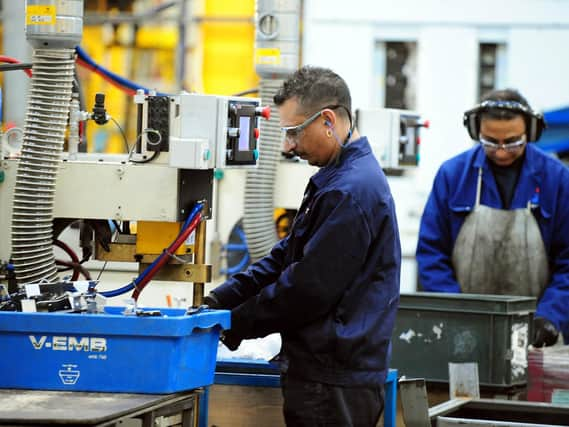The digital world has come to the rescue of the manufacturing sector - Nikki Jones


In the last four months they have had to pivot operations swiftly and smartly to a new way of working and, without doubt, the digital world has come to the rescue.
Not so long ago, some manufacturers would have considered applying Industry 4.0 technologies in day-to-day operations a threat to jobs and a step too far.
Advertisement
Hide AdAdvertisement
Hide AdFor a training provider like the AMRC Training Centre, we would have hesitated at the idea of teaching our 800 apprentices and liaising with our near 300 employers without face-to-face communication for an entire summer term.
It’s amazing what a worldwide pandemic can do to focus the mind; and throughout the manufacturing sector the Covid-19 outbreak has brought digital tech to the fore.
We locked down but we did not close down, because we acted quickly and effectively to move over to the digital world; essentially switching our learning from the real-world classroom to the virtual one.
In this, we have built on the innovative way we have been running remote apprenticeship training to some students for the past two years – originally this was done to save apprentice time and employer travel and accommodation cost; now it has come into its own.
Advertisement
Hide AdAdvertisement
Hide AdWe made sure we communi-cated with our employers and apprentices at every stage of this new normal for learning; and we listened at the same time. For those apprentices who told us they couldn’t access online resources, we provided laptops and dongles.
When they told us they were working irregular hours, we recorded our virtual classroom sessions and ensured our one-to-one support was flexible.
Without abundant digital technologies, we simply could not have achieved this. Today, digital thread is woven through everything we’re doing to adapt, and, by moving quickly, it means our teaching and student experience hasn’t suffered.
In a number of ways, the pandemic has shone a light on UK manufacturing, highlighting what can be possible, but it has also emphasised where the sector can further develop to increase its profits in the future: one is that need for greater agility in manufacturing operations, another is the need for a highly-skilled and adaptable workforce.
Advertisement
Hide AdAdvertisement
Hide AdBusinesses were beginning to appreciate having engineers with the right digital skills allows them to properly embrace technological advances and shore up the pipeline of skilled engineers.
The upheaval of Covid-19 is pushing those considerations to the front of people’s minds and – while organisations like the AMRC work with manufacturers to implement the Industry 4.0 technologies that will allow them to adapt to changing market demands – there is a responsibility on training providers to deliver the workforce employers need to exploit the benefits of digitalisation.
That is not to say there is a lost generation of engineers working right now who will suddenly become obsolete: retraining existing staff is a proven way of developing skills within a company while retaining valued, experienced employees.
Indeed, we could be getting nearer to the ‘golden goose’ engineer – someone who has a background in traditional engineering, such as mechanical or electrical, but who can code, design and, most importantly, understand digital integration.
Advertisement
Hide AdAdvertisement
Hide AdAs we slowly emerge from lockdown and managers reassess the make-up of their shop floors, multi-dimensional engineers such as these will be crucial to the economic recovery of manufacturing.
By Nikki Jones Director of the University of Sheffield AMRC Training Centre
Editor’s note: first and foremost - and rarely have I written down these words with more sincerity - I hope this finds you well.
Almost certainly you are here because you value the quality and the integrity of the journalism produced by The Yorkshire Post’s journalists - almost all of which live alongside you in Yorkshire, spending the wages they earn with Yorkshire businesses - who last year took this title to the industry watchdog’s Most Trusted Newspaper in Britain accolade.
Advertisement
Hide AdAdvertisement
Hide AdAnd that is why I must make an urgent request of you: as advertising revenue declines, your support becomes evermore crucial to the maintenance of the journalistic standards expected of The Yorkshire Post. If you can, safely, please buy a paper or take up a subscription. We want to continue to make you proud of Yorkshire’s National Newspaper but we are going to need your help.
Postal subscription copies can be ordered by calling 0330 4030066 or by emailing [email protected]. Vouchers, to be exchanged at retail sales outlets - our newsagents need you, too - can be subscribed to by contacting subscriptions on 0330 1235950 or by visiting www.localsubsplus.co.uk where you should select The Yorkshire Post from the list of titles available.
If you want to help right now, download our tablet app from the App / Play Stores. Every contribution you make helps to provide this county with the best regional journalism in the country.
Sincerely. Thank you.
James Mitchinson
Editor